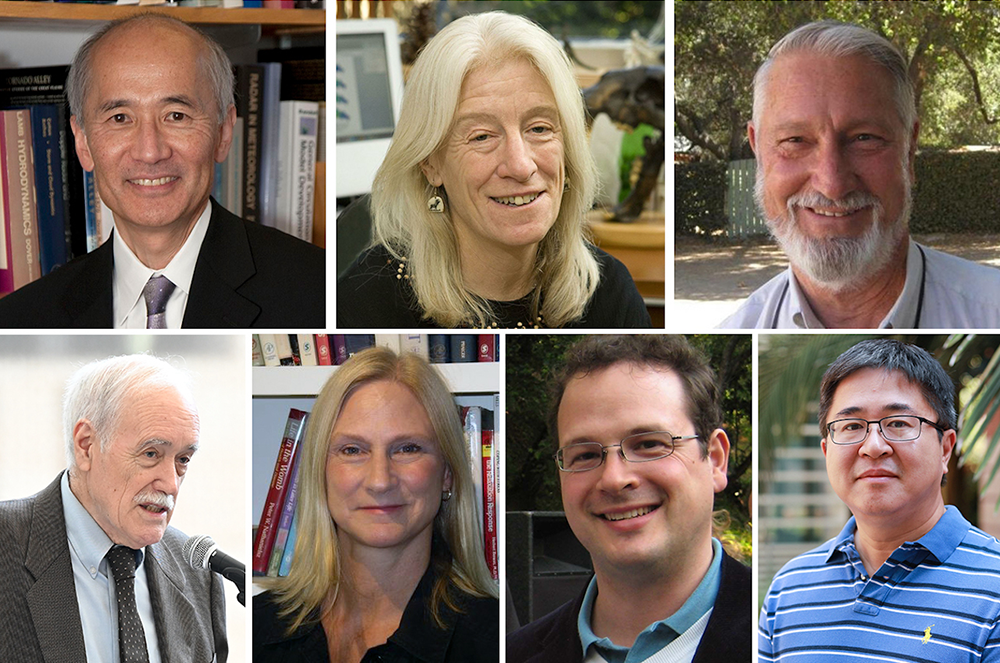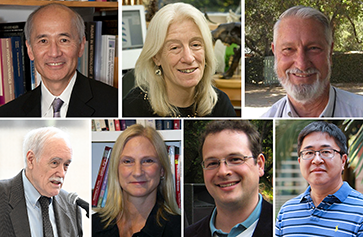7 professors named fellows of the American Association for the Advancement of Science

Clockwise from top-left: Roger Wakimoto, Blaire Van Valkenburgh, Kenneth Nagy, Yi Tang, Tommaso Treu, Christine Dunkel Schetter, Gary Orfield
The American Association for the Advancement of Science, the world’s largest scientific society, has named seven UCLA faculty members as 2022 fellows. Since 1874, the AAAS, which publishes the journal Science, has selected members whose efforts on behalf of the advancement of science, and its applications in service to society, have distinguished them among their peers.
UCLA’s new fellows are:
Dunkel Schetter, a distinguished professor of psychology, researches the effects of prenatal maternal stress and its biopsychosocial mechanisms on preterm births, low birthweight and postpartum depression, with a particular emphasis on the unique risk and resilience factors of Black women and Latinas. Her work has documented that prenatal anxiety predicts a shorter length of gestation and that a corticotrophin-releasing hormone plays a role in earlier births.
Nagy, a professor emeritus of ecology and evolutionary biology, is an animal physiological ecologist best known for his development of a technique that measures how much food, water and energy animals use each day in their natural habitats. He also developed equations that allow scientists to predict such use for animals that have not been studied directly. Since retiring in 2006, Nagy has focused on conservation biology, helping the endangered Mojave desert tortoise by developing predator-resistant enclosures that protect them until they are large enough to enter the open desert and fend for themselves.
Orfield is a distinguished research professor of education, law, political science and urban planning who studies civil rights, urban policy and educational equity. He also co-directs the Civil Rights Project/Proyecto Derechos Civile at UCLA. Orfield’s central interest has been the development and implementation of social policy and the impact of policy on equal opportunity for success in American society.
Tang is a professor of chemistry and biochemistry and of chemical and biomolecular engineering, researches natural product biosynthesis and biocatalysis. His work explores how complex chemical structures are biosynthesized by enzymes in nature. Tang’s lab also aims to discover new natural products for therapeutic and agricultural applications through genome mining, combinatorial biosynthesis and synthetic biology.
Treu is a professor of physics and astronomy at UCLA who studies cosmology, including the formation and evolution of galaxies and black holes. His research is primarily based on observations from the world’s largest optical infrared telescopes, including the W.M. Keck telescopes, the Hubble Space Telescope and the James Webb Space Telescope.
Van Valkenburgh, a professor of ecology and evolutionary biology, studies living species as a key to understanding extinct species, with an emphasis on large predatory mammals such as short-faced bears, saber-toothed cats and dire wolves. To better understand both the dynamics of predator communities and the adaptations of individual species, she explores the fossil record of carnivores from both ecological and evolutionary perspectives.
Wakimoto, UCLA’s vice chancellor for research and creative activities, is an accomplished atmospheric scientist specializing in research on mesoscale meteorology, particularly severe convective storms, tornadoes and radar meteorology. He is a faculty member in the UCLA Department of Atmospheric and Oceanic Sciences. Wakimoto has served as director of the National Center for Atmospheric Research and as assistant director of the National Science Foundation’s Directorate for Geosciences.
A total of 505 scholars were selected as AAAS fellows this year. They will be featured this month in the journal Science and honored this summer in Washington, D.C.
This article originally appeared at UCLA Newsroom. For more news and updates from the UCLA College, visit college.ucla.edu/news.




